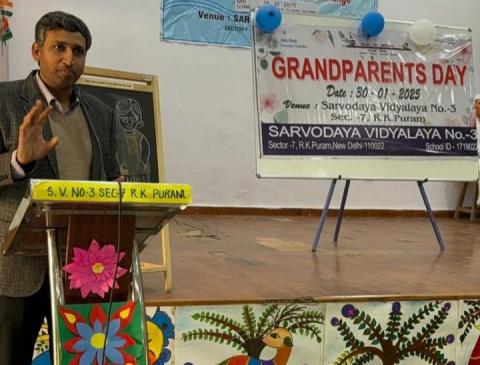
Why Schools Alone Can’t Solve the Learning Crisis
Last week, I had the opportunity to attend Grandparents’ Day at one of the Delhi Government’s schools. It was heartwarming to see how the school welcomed the grandparents and designed events around them. They organized activities in which grandparents could participate. Children also performed for them, presenting group songs and other performances. A neatly packed breakfast, along with tea, was the icing on the cake. The excitement in the eyes of the grandparents as they watched their grandchildren perform was amazing. The children were equally excited to play and perform in front of their grandparents.
On this occasion, I addressed the grandparents and shared my thoughts.
For approximately 2.5 million years, Humans have existed on this planet. Children have always learned alongside their parents, grandparents, families, and the communities they lived in. Learning in schools is quite a recent phenomenon. If we consider the long history of human existence and remove the past 100 or 150 years, we do not see this artificial arrangement of large-scale institutional learning in any society. This is one of the reasons that, despite having resources and teachers, schools have yet to become a natural setting for learning.
The NEP (National Education Policy) estimates that around 50 million children are unable to read and write grade-appropriate texts. Interestingly, all these children attend school. On the surface, this appears to be a challenge for schools, and often, teachers are blamed for not being able to teach basic skills like reading and writing.
However, when we compare this scenario with children attending private schools, we find that most of them enter school already equipped with basic reading and writing skills. Teachers in private schools simply build upon these foundational skills. This suggests that parents who can afford to send their children to private schools can also afford to spend time with them and have the necessary knowledge and skills to impart fundamental literacy.
On the other hand, children attending government schools often lack both of these advantages, particularly in urban settings. Many parents cannot spend time with their children because they must work to meet their daily needs. In most cases, they also lack the knowledge and skills required to teach their children fundamental literacy.
If we use an analogy and see schools as a pond, children in private schools enter with a boat prepared for them, and teachers only need to help them learn to sail. In most government schools, however, children enter the water without a boat, and teachers must build one for them—alongside the children. By the time the boat is built, children in privileged schools have already sailed far ahead. Building a boat requires far greater skill, time, and patience than simply teaching children how to sail.
Almost all educational literature talks about the importance of integrating schools and communities. We all understand how community involvement impacts learning. But the big question is: does our economy allow it? Most parents from disadvantaged sections—and now even from the middle class—are working parents. They do not have time to guide their children's learning. Middle-class parents at least have the option of outsourcing this responsibility by hiring tutors, but this luxury is not available to parents from disadvantaged backgrounds.
Parents, grandparents, families, and society as a whole create the most natural setting for learning. They teach children much more than what is learned in school—values, resilience, and life skills. However, the question remains: does our economy allow for this kind of learning environment, especially when major technocrats are pushing for 90-hour workweeks? Their vision of economic growth often appears detached from social harmony. This alienation of family members from actively engaging in their children's education is a key factor in what is now known as the learning crisis.
- Log in to post comments
